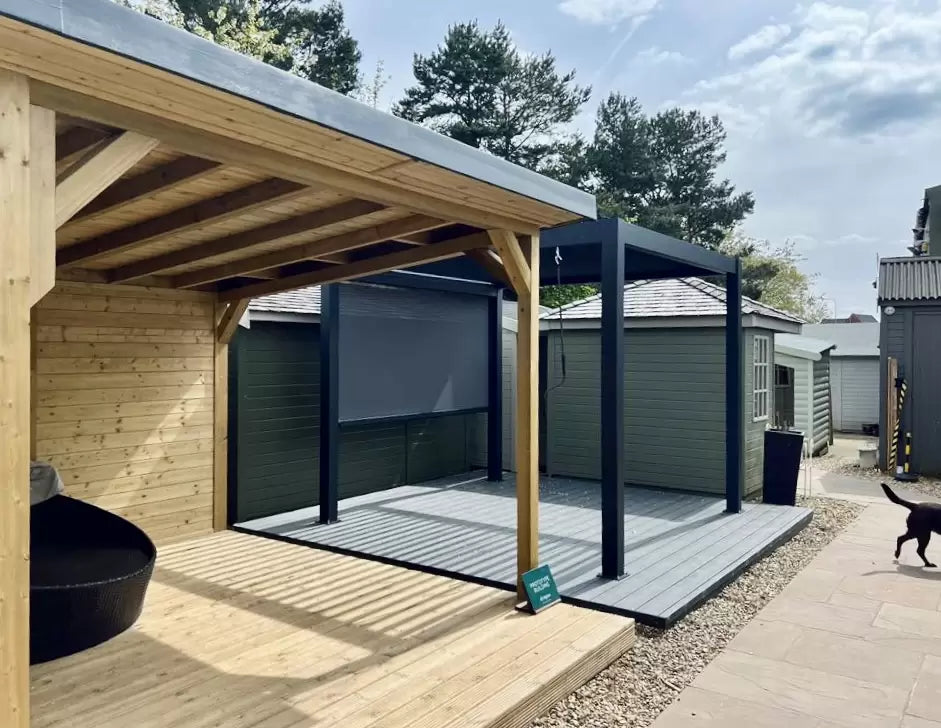
Wooden vs. Aluminum Pergolas: Making the Right Choice for Your Outdoor Space
When it comes to choosing a pergola for your outdoor space, the two most popular materials are wood and aluminum. Each material has its unique advantages and considerations, and understanding these differences can help you make an informed decision. Lets explore the key distinctions between wooden and aluminum pergolas to guide you in selecting the best option for your needs.
Design and Aesthetics
Wooden Pergolas
Wooden pergolas are known for their natural beauty and classic appeal. They blend seamlessly with outdoor environments, providing a warm and inviting aesthetic. The natural grain and texture of wood can complement various landscape styles, from rustic to traditional gardens. Wood can be stained or painted in a variety of colors to match your home's exterior or your personal taste. Common wood types used for pergolas include cedar, redwood, and pressure-treated pine, each offering different levels of durability and appearance.
Aluminum Pergolas
Aluminum pergolas offer a sleek, modern look that can enhance contemporary outdoor spaces. They are available in a wide range of finishes and colors, often designed to mimic the look of wood while providing a more streamlined appearance. Aluminum's clean lines and uniform finish can complement minimalist and modern architectural styles. Unlike wood, aluminum does not require painting or staining, maintaining its appearance over time with minimal upkeep.
Durability and Maintenance
Wooden Pergolas
Wooden pergolas require regular maintenance to preserve their appearance and structural integrity. This includes staining or painting to protect against weather damage, as well as treatments to prevent rot, mold, and insect infestations. Over time, wood can warp, crack, or fade due to exposure to the elements, necessitating repairs or replacements. Due to its susceptibility to damage, wooden pergolas do not offer substantial support for harsh wind and snow commonly seen in many climates. However, with proper care, wooden pergolas can last for many years and continue to offer a natural charm.
Aluminum Pergolas
Aluminum pergolas are highly durable and low-maintenance. They are resistant to rust, corrosion, and pests, making them an excellent choice for longevity. Aluminum does not warp or crack, and its finish typically remains intact without the need for frequent maintenance. Occasional cleaning is usually sufficient to keep aluminum pergolas looking their best. This durability makes aluminum a cost-effective option in the long run, as it minimizes the need for repairs and replacements. Alfresco Pergolas offer the best snow and wind load on the market, making sure that your backyard oasis is still standning even after the harshest of storms.
Environmental Impact
Wooden Pergolas
The environmental impact of a wooden pergola largely depends on the source of the wood. Sustainably sourced wood from managed forests can be an environmentally friendly choice. However, the treatments required to protect wood from rot and pests can involve chemicals that have environmental considerations. Additionally, the need for regular maintenance and eventual replacement can increase the overall environmental footprint over time.
Aluminum Pergolas
Aluminum is a recyclable material, and many aluminum pergolas are made from recycled content, reducing their environmental impact. The manufacturing process for aluminum can be energy-intensive, but the material's durability and recyclability often offset this initial impact. Aluminum pergolas' low maintenance requirements and long lifespan further contribute to their sustainability, as they require fewer resources over time.
Cost Considerations
Wooden Pergolas
The initial cost of a wooden pergola can vary widely depending on the type of wood used. Cedar and redwood are more expensive than pressure-treated pine but offer greater natural resistance to decay and insects. While the upfront cost of wood can be lower than aluminum, the ongoing maintenance expenses can add up over time, potentially making wood more costly in the long run.
Aluminum Pergolas
Aluminum pergolas generally have a higher initial cost compared to wood. However, their low maintenance requirements and durability often result in lower long-term costs. Homeowners can save money on maintenance, repairs, and replacements, making aluminum a cost-effective choice over the lifespan of the pergola.
Which Is Right For You?
Both wooden and aluminum pergolas offer distinct advantages and can enhance your outdoor living space in different ways. Wooden pergolas provide a timeless, natural beauty that can complement traditional and rustic landscapes but require regular maintenance to preserve their appearance and durability. Aluminum pergolas offer a modern, sleek look with minimal upkeep, making them an excellent choice for those seeking a low-maintenance, long-lasting solution.
Ultimately, the best choice for your pergola depends on your aesthetic preferences, maintenance capabilities, environmental considerations, and budget. By understanding the key differences between wooden and aluminum pergolas, you can select the option that best suits your needs and enhances your outdoor space for years to come.
